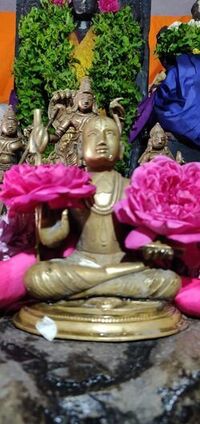Dwadasha Stotra 1 : SriSthuthi Verse 9
Aanandatheerthamunisanmukhapankajottham
Saakshathramaaharimanah priyamutthamaartham
Bhakthyaa pathathyajithamaathmani sannidhaaya
Yassthothramethadabhiyaathi thayorabheeshtam
In several of his works Madhwacharya has called himself Anandateertha or Poornapragna.
- Anandateertha – Describes innate happiness of his soul, the one who gives nectar of happiness to others through his works and teachings
- Poornapragna – Describes complete knowledge
- Muni – Manana yukta muni – one who remembers God continuously – one who sees God manifesting in omakara ( mandukaupanishad) – One who does Pranavaupasane.
Madhwacharya did pranavaupasane and give its deekshe/knowledge to Vishnuteertharu(brother of Madhwacharyaryu) (madhwavijaya) and not to any of his 9 shishyas because of jeeva yogathe of vishnuteertaru.
Sanmukha – pranadevaru(sath), having good knowledge
This sthothra has been recited by the beautiful lotus like face of Aananda Theertha, the good ascetic. It has excellent meanings which will please the great couple Ramaa and Hari. A devotee who recites this sthothra while keeping the form of Hari called Ajitha, steadfastly in his heart will get whatever he desires due to the blessings of both of them.
Any body who has any familiarity with the style of Acharya Madva’s compositions would note a few special features about this sthothra.
1. The Phala shruthi (No. 9) is very significant. The sthothra has been described by the author himself as Utthamaarthaa – with excellent meanings. The manner of getting the grace of Lakshmi is also indicated – the divine couple should always be prayed together with her consort, the Supreme being being enshrined in one’s heart. Such a prayer will certainly get the devotee all his aspirations – including the more mundane ones like wealth etc. The usual disadvantage of wealth is that it obscures God in our minds and on the other hand brings in evil thoughts, deeds and attachment leading to bondage in Samsara will also be over come only when it is clearly understood that even Goddess Ramaa, the giver of all worldly prosperity is entirely dependent on the Supreme being and nothing is done without His will.
2. The other important feature of this sthothra is to clearly define the importance of Vishnu Sarvotthamathva and Tharathamya or gradation of the gods. Thus prayers to other dieties should never be offered without a simultaneous appreciation of their gradation with their superior and inferior souls and the total all encompassing dependence on Lakshmi and the Supreme Being. The point is also forcefully made that all the attainments of different gods,. ascetics like Rishis etc are entirely due to the grace of Goddess Lakshmi and her consort.
3. A careful reading of the sthothra also conveys another important point that the differences between gods themselves are very large, though in comparison to Lakshmi or the Supreme Being the difference may appear small. Thus, the power of Garuda is some thing which is beyond the imagination of Indra and lesser gods. The power of Rudra at the time he destroys the universe in dissolution is such that lesser gods who are feared like Indra, Surya, and even the god of death Yama are insignificant before him. The Harikathamruthasara explains this very well. Thus, Sri Jagannathadasaru has composed the following Sandhis specially dealing with this subject.
i. Guna Thaarathamya
ii. Aarohana Thaarathamya
iii. Avarohana Thaarathamya
iv. Anukramanikaa Thaarathamya
v. Brihath Thaarathamya
vi. Anu Thaarathamya
vii. Daithya Thaarathamya
The emphasis on the knowledge of a devotee of God in this regard is based on the proposition that that the knowledge of Bheda or difference is incomplete without knowing how – Bhedo Jiva ganaah Hareh anucharaah , Neechocchabhaavam gathah – in the words ascribed to Sri Vyasaraja. Acharya Madhva in his Bhashya on Chaandogya has quoted :
“Naamaadi maaruthaantheshu deveshvebhyascha bhedathah
Upaasithah Harih mukthim dadyaath naasthyathra samshayah”
“Thaarathamya parijnaanaath theshu dhyaathah vimukthidah
preethim na chaanyathaa yaayaath ithi shasthrasya nirnayah”
– TattvaViveke.
“Thaarathamya parijnaanath anutthaanam thamo vrajeth” – ithi
Mahabharatha Thathparya nirnaye
The most important message that Acharya Madhva has given here is that whenever anyone other than Sri Hari is to be worshipped or prostrated to, it must always be as a subordinate diety to the Lord – with due consciousness of His uniqueness and infinite superiority. After Him, Lakshmi, though a dependent soul, has certain unique charactersitics which makes her completely different from all other souls – being non-atomic in size, pervading in space and time just as the Supreme Being does, never being subject to the effects of Ajnana or misery/bondage etc. She is also His greatest devotee and is so close to Him that they can never seperated. She is thus given so much independence and capacity that all other souls are totally subservient to her. The central theme of Thaarathamya should always be in our minds when ever she is worshipped. It goes without saying that she should never be worshipped for small favours like wealth etc. but for such things like Jnana (she is the Abhimaani devathaa of shruthies), destruction of Ajnana/ Avidya (In her Durga form, she is the Asbhimaani devathaa of Thamoguna) and above all for the grace of her Lord with whom she should ever dwell in our hearts. This is one of the Utthamaarthas which Acharya Madhva has said in this shloka.



